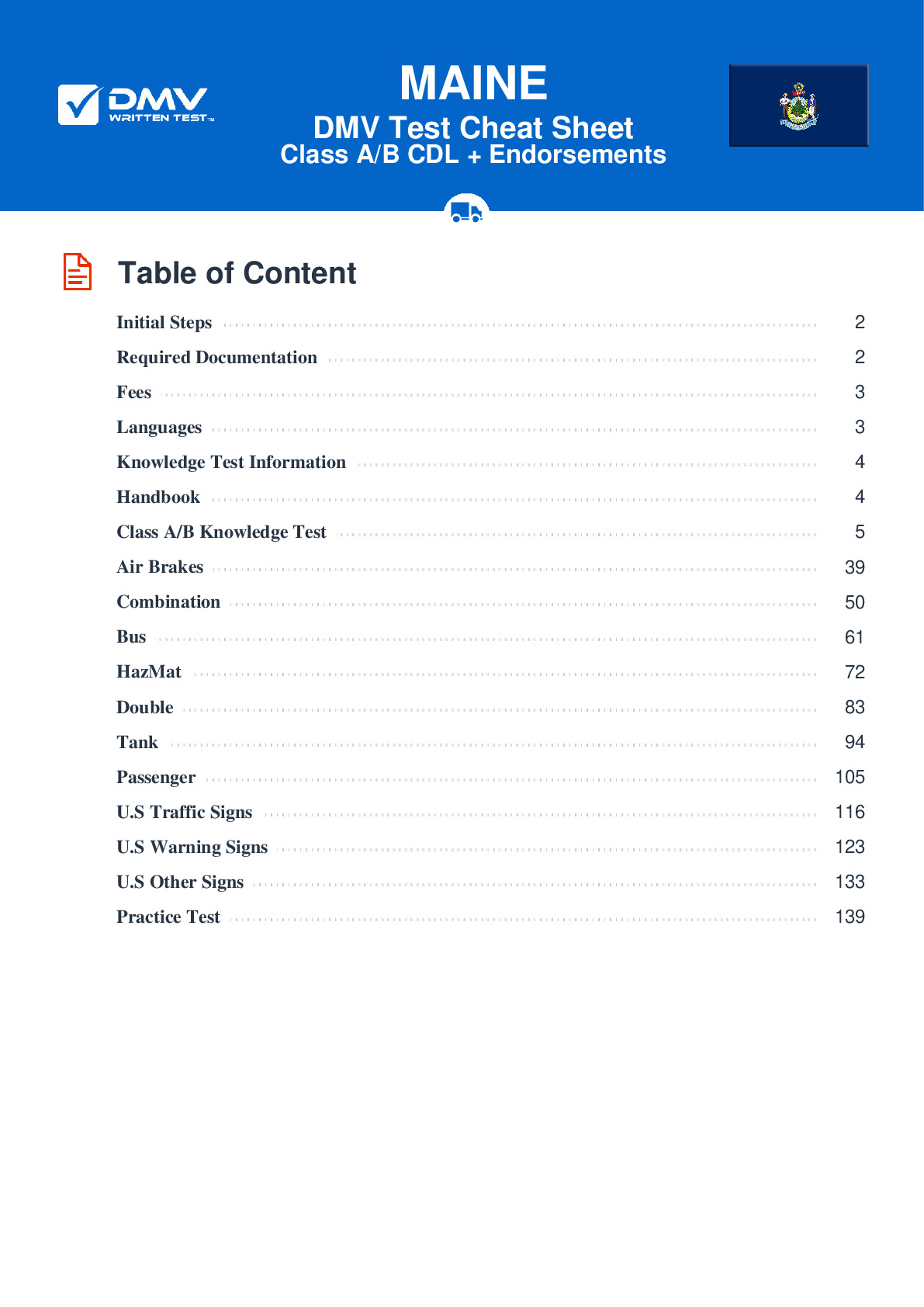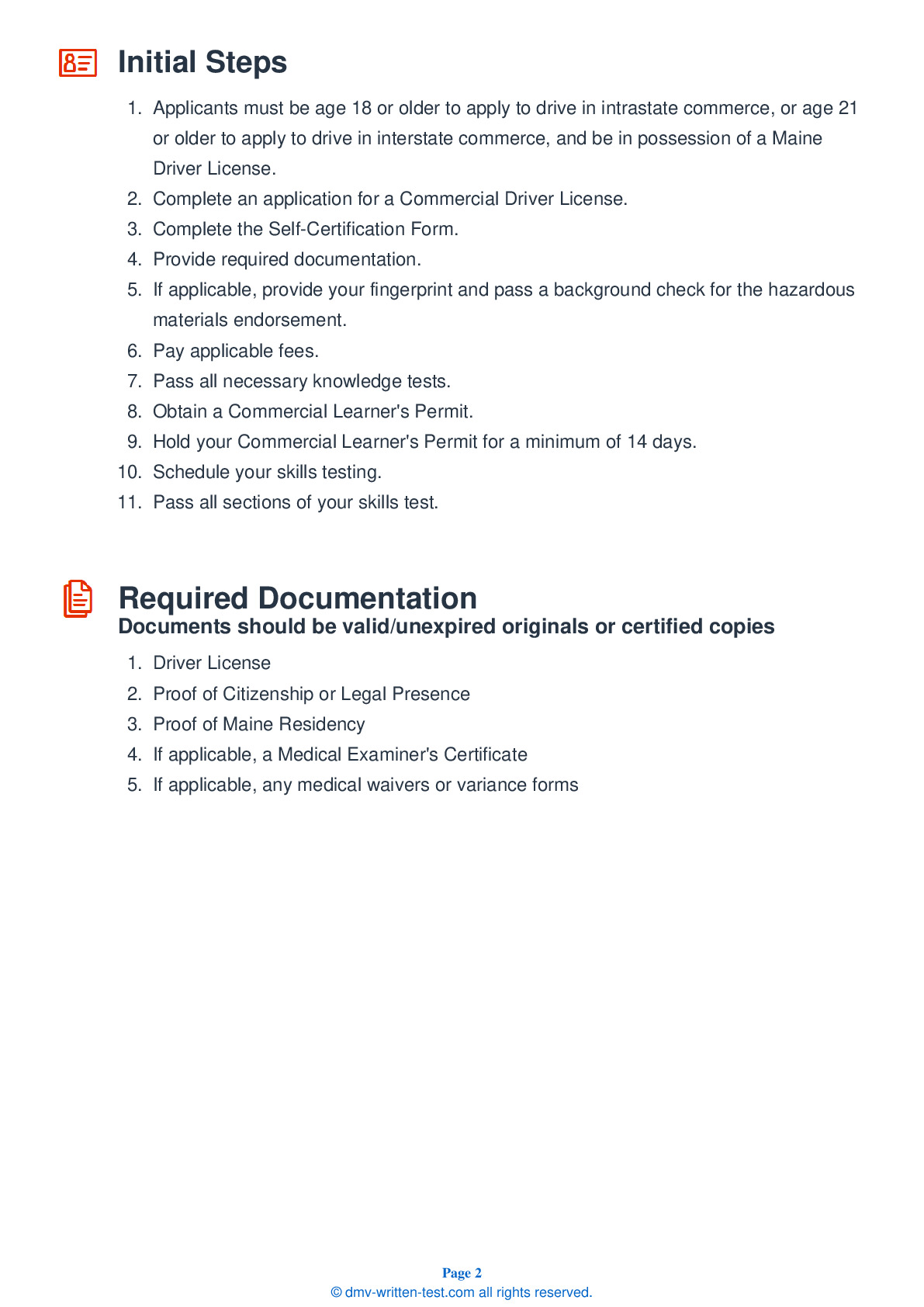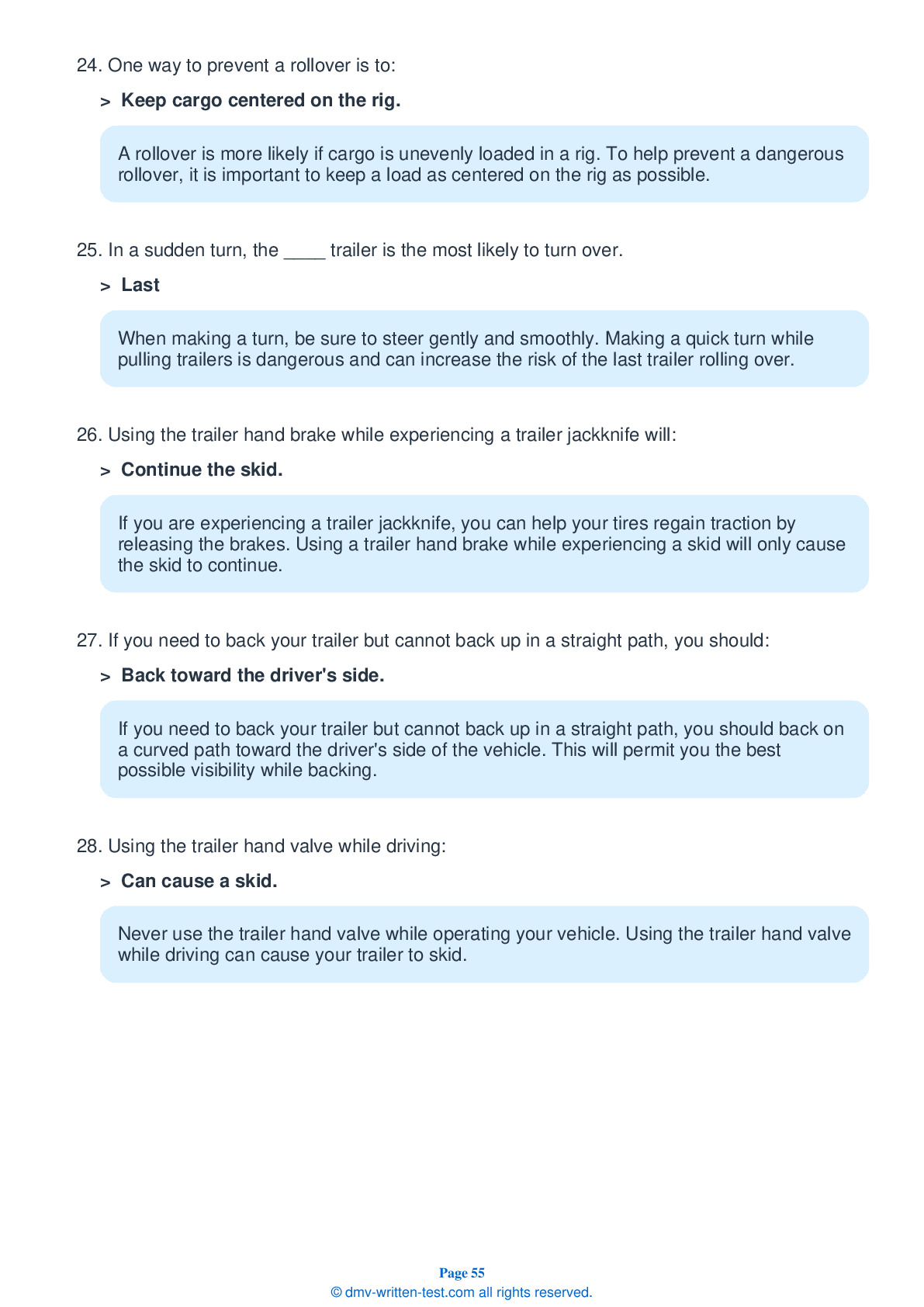Knowledge Test Class B
This license is required for driving a single vehicle with a GVWR of more than 26,001 pounds, and a trailer not to exceed 10,000 pounds gross vehicle weight rating, or a vehicle designed to transport 24 or more people (including the driver). To receive this license, applicants must pass a 50-question test. To pass, applicants must answer 40 questions correctly. Each question has three possible answer choices. Test questions come from the Maine Commercial Driver License Manual. Questions come from chapters covering: Introduction, Driving Safely, Transporting Cargo Safely, Air Brakes (if applicable), Pre-Trip Vehicle Inspection Test, Basic Vehicle Control Skills Test and On-Road Driving.. Endorsements that may be used with a Class B CDL are: Hazardous materials, Tank, Passenger, HazMat and Tank, Air Brakes and School bus.
43. In a vehicle with dual air brakes, a leak in one system ____ the second system.
A dual air brake system is made up of two separate air brake systems. If there is an air leak in one system, it may not affect the other.
44. Cargo inside a trailer:
Cargo inside a trailer must be secured appropriately to prevent it from shifting in transit.
45. After two violations of any state law regarding hand-held mobile phone use:
If you are twice convicted of violating any state law regarding hand-held mobile phone use, your CDL will be disqualified. Consequences will become more severe with subsequent violations.
46. A danger of swerving to avoid a hazard while driving a large truck is that:
While swerving can sometimes be the safest way to handle a hazard on the roadway, doing so is not without risk. Top-heavy vehicles and tractors with multiple trailers may flip over in a swerve.
47. When taking a driving test:
Skills tests must be taken in the type of vehicle the applicant plans to drive. The applicant is generally responsible to supply the testing vehicle.
48. When parked on a flat surface, you should:
When parking on a level surface, you should use wheel chocks. If the vehicle is not equipped with spring brakes, this is essential to prevent the trailer from moving.
49. While operating on a downgrade, you should brake until you reach a speed that is:
While driving downhill, you should hold down the brake pedal until your vehicle reaches a speed 5 mph below your safe speed, then release the brake pedal. Repeat this process.
50. Rust around wheel nuts may mean:
Rust around wheel nuts may mean that they are loose. Check the tightness of the nuts if you see any rust in the area.
Frequently Asked Questions
Here are the steps to obtain a Class B CDL license in Maine:
1. Obtain a Maine CDL handbook from the Bureau of Motor Vehicles (BMV) or download it from their website.
2. Obtain a medical certificate from a certified medical examiner, as it is required for all CDL applicants.
3. Obtain a learner's permit by passing the written knowledge test specific to the class of license you are applying for. You will need to provide proper identification and pass vision screening as well.
4. After obtaining your learner's permit, you may practice driving with a qualified CDL holder who has the same class license as the one you are applying for.
5. Schedule and pass the road skills test at an authorized BMV testing location. This test will include pre-trip vehicle inspection, basic vehicle control skills test, and an on-road driving test.
6. Pay the CDL license fee and obtain your Class B CDL license from the BMV.
It is important to note that additional endorsements may be required for certain types of Class B vehicles or cargo, such as hazardous materials or passenger transport.
1. Single vehicles with a Gross Vehicle Weight Rating (GVWR) of 26,001 pounds or more.
2. Combination of vehicles with a GVWR of less than 26,001 pounds, but with a trailer with a GVWR of more than 10,000 pounds.
Examples of vehicles you can operate with a Class B CDL license include:
- Straight trucks (e.g., dump trucks, box trucks, and delivery trucks)
- Large buses (e.g., school buses and city buses)
- Segmented buses
- Truck tractors towing trailers less than 10,000 pounds
- Cement mixers
- Garbage trucks
It's important to note that additional endorsements may be required for certain types of Class B vehicles or cargo, such as hazardous materials or passenger transport.
1. Be at least 18 years of age to operate within the state of Maine or 21 years of age to operate interstate or transport hazardous materials.
2. Hold a valid non-commercial driver's license in Maine.
3. Obtain a medical certificate from a certified medical examiner.
4. Pass the Maine CDL written knowledge test specific to the class of license you are applying for, as well as any required endorsement tests.
5. Obtain a learner's permit by passing vision screening and providing proper identification.
6. Practice driving with a qualified CDL holder who has the same class license as the one you are applying for.
7. Pass the road skills test at an authorized BMV testing location, which includes pre-trip vehicle inspection, basic vehicle control skills test, and an on-road driving test.
8. Pay the CDL license fee and obtain your Class B CDL license from the BMV.
It is important to note that additional endorsements may be required for certain types of Class B vehicles or cargo, such as hazardous materials or passenger transport.
1. Passenger endorsement (P) – required to operate a vehicle designed to transport 16 or more passengers, including driver.
2. School Bus endorsement (S) – required to operate a school bus.
3. Tanker endorsement (N) – required to operate a vehicle that transports liquids or gas in bulk containers with a capacity of 119 gallons or more.
4. Hazardous materials endorsement (H) – required to transport hazardous materials that require placards.
To obtain any of these endorsements, you must pass additional written tests and meet other requirements set by the Maine Bureau of Motor Vehicles (BMV). It is important to note that some endorsements may also have age requirements and additional fees associated with them.
1. Pre-Trip Inspection: You will be required to perform a complete vehicle inspection to ensure that the vehicle is safe to operate. You will be asked to identify and explain the various components of the vehicle, such as the brake system, steering mechanism, and emergency equipment.
2. Basic Vehicle Control: You will be tested on your ability to control the vehicle in various situations, such as backing, turning, and parking.
3. On-Road Test: You will be required to demonstrate your ability to safely operate the vehicle on public roads. The examiner will evaluate your driving skills, including your ability to obey traffic laws, adjust speed for changing conditions, and maintain proper lane position.
During the skills test, you will be required to demonstrate your ability to perform each task safely and effectively. If you fail any part of the test, you will be required to retake that portion of the test before you can obtain your Class B CDL license.
1. Air Brake Restriction: If you take the skills test in a vehicle without air brakes, you will receive an air brake restriction on your license. This means that you will not be authorized to operate a vehicle equipped with air brakes.
2. Automatic Transmission Restriction: If you take the skills test in a vehicle with an automatic transmission, you will receive an automatic transmission restriction on your license. This means that you will not be authorized to operate a vehicle with a manual transmission.
3. Intrastate Only Restriction: If you only plan to operate a commercial vehicle within Maine's borders, you may receive an intrastate-only restriction on your license.
4. Passenger or School Bus Endorsement Required: If you plan to transport passengers or operate a school bus, you will need to obtain the appropriate endorsement on your license.
It is important to note that these restrictions may vary based on your individual circumstances and driving history. Make sure to check with the Maine Bureau of Motor Vehicles (BMV) for specific information about any restrictions or limitations that may apply to you.
However, it's important to note that the skills test for a Class B CDL must be taken in English. This is because the examiner must be able to communicate with you during the test to ensure your safety and the safety of others on the road.
If you need to take the written test in a language other than English, you will need to schedule an appointment with the BMV and indicate your language preference when you register. The BMV will provide an interpreter who will help translate the questions and answers for you during the test.
It's important to note that even if you take the written test in another language, you will still need to have a good understanding of English since signs and other road markings will be in English.
Some examples of accommodations that may be available include extra time to complete the test, a separate testing room, or the use of a reader or sign language interpreter. To request accommodations, you will need to fill out a Request for Accommodations form and submit it to the BMV along with documentation from a qualified professional explaining your disability and how it impacts your ability to take the test.
It's important to note that accommodation requests must be made in advance of the test date, so be sure to plan ahead. The BMV will review your request and determine what accommodations are appropriate based on your individual needs and the requirements of the test.
If you have any questions about requesting accommodations for the Class B CDL written test, contact the Maine BMV for more information.
It's important to note that if you fail the written test three times, you will need to wait at least 30 days before taking the test again. Additionally, if you fail the skills test three times, you may be required to complete additional training before being allowed to take the test again.
Before retaking the written test, it's a good idea to review the material and study more. You can obtain a copy of the Maine CDL Manual from your local BMV office or download it from their website. Additionally, there are online practice tests available that can help you prepare for the exam.
Remember, passing the written test is just one step in obtaining your Class B CDL. You will also need to pass a skills test that includes a pre-trip inspection, basic vehicle controls, and a road test.




